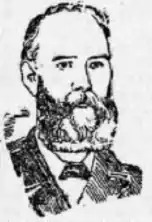Robert Burnie
Robert John Dickson Burnie (8 April 1842 – 6 March 1908)[1][2] was a Liberal politician who served as MP for the Swansea Town constituency from 1892 to 1895. He was regarded as being on the radical wing of the party and was popular with working-class electors. Defeated by Sir John Llewelyn in 1895 he was rejected as a candidate for the constituency in 1900 due to his opposition to the South African War.
Robert Burnie | |
|---|---|
 Burnie in 1895 | |
| Born | Robert John Dickson Burnie 8 April 1842 |
| Died | 6 March 1908 (aged 65) |
| Nationality | English |
| Predecessor | Lewis Llewelyn Dillwyn |
| Successor | Sir John Dillwyn-Llewellyn, Bt |
| Political party | Liberal |
Early life
Burnie was born in 1842 at Dawlish in South Devon where his father, John Dickson Burnie, was a builder and contractor. The family came originally from Dumfriesshire.[3] As a young man, Burnie worked in the railway trade and came to Swansea in 1870 when Shacklefgord, Ford & Co., the works at Cheltenham, where he was general manager, were re-located.[3] He became general manager of the firm in 1876.
Public life
Burnie was elected to the Sweansea Town Council in 1877 and became active in the municipal life of the town, serving as Mayor and Chairman of the Harbour Trust. In 1889, however, the year Swansea became a County Borough, he chose to stand down.[4]
Political career
By the 1890s, Burnie was building a political reputation beyond his adopted town. In 1890 he was nominated to be Liberal candidate for the vacancy in East Carmarthenshire following the death of David Pugh but he withdrew before the selection conference.[5] He became treasurer of the Welsh Farmer's Defence Fund, which was formed in light of tithe agitation, and in early 1892 he made a tour through the counties of South Wales where protests had taken place.[3] He came close to winning the Liberal nomination at Chelsea and also at Mid Glamorgan where he was narrowly defeated in 1890 by Samuel Thomas Evans largely. it was stated, due to Evans being a Welsh-speaking Welshman.[3]
Member of Parliament for Swansea
The death of the sitting member of Swansea Town, Lewis Llewelyn Dillwyn, shortly before the 1892 General Election led to Burnie being selected as candidate.[3]
Burnie launched his campaign at a public meeting at the Albert Hall, Swansea, where Sir Hussey Vivian presided and endorsed Burnie's campaign in a speech resonating with references to his own father's time as MP for Swansea. Vivian's intervention may have been calculated to counter the impact of the Conservatives' decision to adopt Sir John Llewelyn, a very popular figure locally and nephew of the late member, Lewis Llewelyn Dillwyn.[6]
Having been defeated in 1895, Burnie was again adopted as candidate in 1900. However, he withdrew over his opposition to the South African War.[7]
References
- "The Late Mr R D Burnie". The Cambrian. 13 March 1908. hdl:10107/3348571 – via Welsh Newspapers.
- "News of the West: Dawlish". Western Times. Exeter, Devon. 10 March 1908. p. 2. Retrieved 7 August 2014 – via The British Newspaper Archive.
[Entire paragraph] Mr. Robert Dickson Burnie, who died at Sketty, near Swansea, which borough he formerly represented in Parliament for many years, carried on business as a builder at Dawlish. He was born in 1842, and was consequently 66 years of age. The deceased's first business training was in the office of the chief engineer of the old Devon and Cornwall Railway Co. In 1864 he was appointed manager of the Bristol and South Wales Railway Carriage and Wagon Company, Cardiff.
- "The Political Campaign in Swansea". Cambrian. 1 July 1892. Retrieved 23 May 2014.
- "Mr Robert D. Burnie and his Constituents. A Farewell Meeting". Cambrian. 25 October 1889. Retrieved 25 May 2014.
- "The Vacancy for East Carmarthenshire". Carmarthen Journal. 18 July 1890. p. 6. Retrieved 8 December 2016.
- "Another Enthusiastic Liberal Demonstration at the Albert Hall". Cambrian. 1 July 1892. Retrieved 24 May 2014.
- "Representation of Swansea Town. Mr Burnie's Withdrawal Accepted". South Wales Daily News. 3 July 1900. p. 6. Retrieved 9 December 2017.